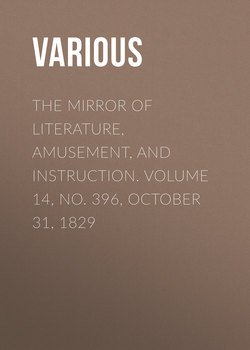The Mirror of Literature, Amusement, and Instruction. Volume 14, No. 396, October 31, 1829

Реклама. ООО «ЛитРес», ИНН: 7719571260.
Оглавление
Various. The Mirror of Literature, Amusement, and Instruction. Volume 14, No. 396, October 31, 1829
BLARNEY CASTLE
THE ANNUALS
FINE ARTS
SCHOOL OF PAINTING AT THE BRITISH INSTITUTION, PALL MALL
THE CONTEMPORARY TRAVELLER
A TOUR IN THE ISLAND OF JERSEY
THE NATURALIST
THE MOLE
CLIMATE OF THE CAPE OF GOOD HOPE
Sea Pens
THE RED SEA-PEN IS
SPIRIT OF DISCOVERY
THE SELECTOR; AND LITERARY NOTICES OF NEW WORKS
AN OLD MAN'S STORY
THE LITTLE MAJOR'S LOVE ADVENTURE
THE SKETCH-BOOK
ANTWERP CATHEDRAL
THE GATHERER
ORIGIN OF THE WORD FARM
THOMAS PAINE
EPIGRAM
LIMBIRD'S EDITIONS
Отрывок из книги
Glancing back to the commencement of the nineteenth century, the only annual record of poetry and prose which we recollect, was "The Flowers of Literature;" a thick duodecimo, habited in a flesh-coloured wrapper, and retaining in its print and pages, the quaintness which characterized "the good old days" of the "Universal Magazine;" and which still clings, though somewhat modified, to the patriarchal pages of Sylvanus Urban. The matter was in accordance with the manner—a medley of prosing articles, from the titles of which we might select, as indicative of their style, "Ode to Despair;" "Topographical Description of Paris;" "The Sailor;" more agreeably interspersed with some effusion of Mrs. Barbauld, or Mrs. Opie; mingled, again, with sundry "Observations on the Present State of the War," written by some sleepy newspaper editor, whose language we might assimilate with, "We have received intelligence from," &c. Here and there, perhaps, a straggling beam of genius broke through the mental twilight, in the shape of, "Some Account of the poet, Burns;" a Rustique by Bloomfield, or an elegant sonnet by Bowles or Charlotte Smith. The rest of would-be-sonneteers, tragedy-writers, and essayists, have long ago found, with their mediocrities, a congenial oblivion in "the tomb of all the Capulets."
But suddenly, and without much premise to warrant the commencement of such an era, the department of our imaginative literature was established in patronage and importance; and those "trivial, fond records," which were wont only to sparkle a brief endurance in the mutable columns of a newspaper, or doomed, when existing in fragile manuscript, "to die and be forgot," found a refuge from their Lethean fate in the numerous Magazines which the increased taste, and avidity for reading, evinced by the public, had called into existence. Still there was a desideratum, which these adornments of English Literature, "The Annuals," alone supplied. The casual tones which emanated from the "transcendent masters of the lyre," were not to be lost to "the public ear" for want of "a circulating medium;" and Ackermann, a name familiar to the lovers of pictorial art, had the honour of first setting England the example of preserving her valuable anthology, by producing his attractive Annual, "The Forget-Me-Not;" a species of literature which presents us with the pleasing facility of holding yearly communion with our poets and authors, without being subjected to the tedium of awaiting their protracted appearance in a more voluminous shape. We can now more frequently greet Anacreon Moore, wreathing his harp with the paternal shamrock, characteristically mingled with "pansies for love;" Montgomery, mourning over our nature's degradation; telling us of the affections and passions of earth, yet luring us to higher hopes and brighter consummation; his every line evincing that chastened sorrow which Byron threw into the portrait of the Sheffield bard—
.....
Interspersed with the emanations of our existing bards, we have, occasionally, those precious morceaux which have been bequeathed us by the illustrious dead. Trifles, yet how esteemed! Remembrances of Byron, with his fiery impetuosity, spurning the trammels of worldly sorrow; and prescribing death as a panacea for his lamentable despair; yet subduing us with refined regrets, as he was wont, in his changing mood,
Shelley, misanthropically commencing with the turbulence of the chainless sea: a spirit matured to madness by the overawing and supernatural terrors of German romance: as he asserts himself to be, in his lamentation for the author of Endymion, one who
.....